Zoom
Trash

Learning. Syllabi Social Media Literacies (Based on Net Smart) First taught at Stanford, Winter 2013.
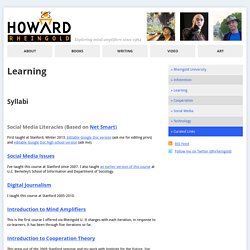
Editable Google Doc version (ask me for editing privs) and editable Google Doc high school version (ask me). Social Media Issues I’ve taught this course at Stanford since 2007. Digital Journalism I taught this course at Stanford 2005-2010. Introduction to Mind Amplifiers This is the first course I offered via Rheingold U. Introduction to Cooperation Theory This grew out of the 2005 Stanford seminar and my work with Institute for the Future.
The Infotention Network. MIND AMPLIFIERS. CRAP DETECTION. Kumu. HRU ALUMNI. SMART MOBS. Douglas Engelbart : The Mother of All Demos (1/9) Mind Amplifiers. HOWARD RHEINGOLD. THINK-KNOW TOOLS. Tools For Thought. 787283.Rheingold Jandric. NET SMART. Howard Rheingold - Net Smart: How to Thrive Online. We are delighted to have our own Howard Rheingold (hlr) with us to talk about his new book Net Smart: How to Thrive Online.
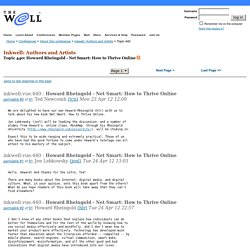
Jon Lebkowsky (jonl) will be leading the discussion; and a number of alumni from Howard's online class, MindAmp, through his Rheingold University ( will be chiming in. One Conversation Begat Another: Howard Rhinegold and Henry Jenkins. Over the last two installments, I’ve shared a short exchange between myself, Mimi Ito, and danah boyd, the three authors of the newly released book, Participatory Culture in a Networked Era.

Today, I want to share the video of an interview I did with Howard Rhinegold about the book. The video was originally circulated via the Digital Media and Learning blog, but I thought there would be people here who had not seen it.
Man-Computer Symbiosis. Man-Computer Symbiosis J.
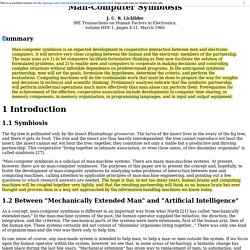
C. R. Licklider IRE Transactions on Human Factors in Electronics, volume HFE-1, pages 4-11, March 1960 Summary Man-computer symbiosis is an expected development in cooperative interaction between men and electronic computers. 1.1 Symbiosis The fig tree is pollinated only by the insect Blastophaga grossorun. Engelbart: Augmenting Human Intellect (1962) As We May Think - Vannevar Bush - The Atlantic.
As Director of the Office of Scientific Research and Development, Dr.
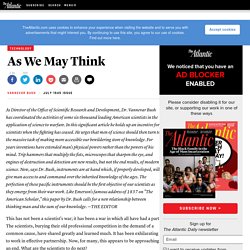
Vannevar Bush has coordinated the activities of some six thousand leading American scientists in the application of science to warfare. In this significant article he holds up an incentive for scientists when the fighting has ceased. He urges that men of science should then turn to the massive task of making more accessible our bewildering store of knowledge. For years inventions have extended man's physical powers rather than the powers of his mind. Trip hammers that multiply the fists, microscopes that sharpen the eye, and engines of destruction and detection are new results, but not the end results, of modern science. This has not been a scientist's war; it has been a war in which all have had a part. U.
Lucerne - IKM - Events - keynote conversation with Howard Rheingold. Wer für diesen spannenden Anlass keine Einladung erhalten hat, über den nächsten Anlass aber gerne informiert werden möchte, kann sich via nachstehender Mail-Adresse auf die IKM-Verteilerliste setzen lassen.

Kontakt Institut für Kommunikation und Marketing IKM. Howard Rheingold: Knowing How to Collaborate Is Essential. I just read the Kindle edition of “Net Smart,” written by writer and critic Howard Rheingold.
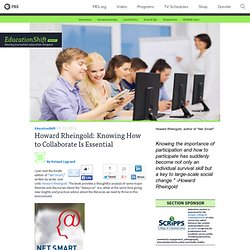
The book provides a thoughtful analysis of some major theories and discourses about the “always on” era, while at the same time giving new insights and practical advice about the literacies we need to thrive in this environment. I’ve followed Rheingold’s posts and videos for some time now, attended presentations, and participated in some of his courses. He’s not only an expert in virtual communities (a term he coined himself) and social media, but also teaches digital journalism.
The virtual community. Ethan Zuckerman - Rewire: Rethinking Globalization in an Age of Connection. Jon, Krebs's research is really helpful stuff.
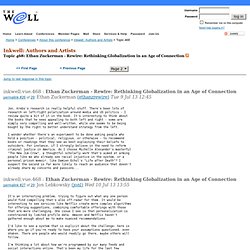
There's been lots of research on left/right polarization around media and US politics - I review quite a bit of it in the book. It's interesting to think about the books that he sees appealing to both left and right - some are simply very compelling and well-written, while one seems to be being bought by the right to better understand strategy from the left. I wonder whether there's an experiment to be done asking people who hold a position - political, religious, or otherwise - to recommend books or readings that they see as best explaining their beliefs to outsiders.
For instance, if I strongly believe in the need to reform criminal justice in America, do I choose Michelle Alexander's masterful "The New Jim Crow", a thoughtful scholarly work that's aimed at arming people like me who already see racial injustice in the system, or a personal prison memoir, like Damien Echol's "Life after Death"? Members: Enter the conference to participate. Books. Tools for Thought: The History and Future of Mind-expanding Technology (1985) Full text South of San Francisco and north of Silicon Valley, near the place where the pines on the horizon give way to the live oaks and radiotelescopes, an unlikely subculture has been creating a new medium for human thought.
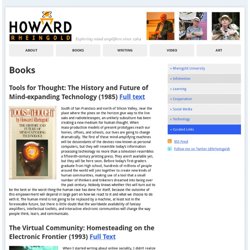
When mass-production models of present prototypes reach our homes, offices, and schools, our lives are going to change dramatically. Smart Mobs » Page not found. The chapters of Smart Mobs, including summaries of each chapter and weblog entries for that chapter.
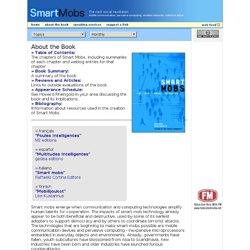
A summary of the book Links to outside evaluations of the book. See Howard Rheingold in your area discussing the book and its implications. Information about resources used in the creation of Smart Mobs. Smart mobs emerge when communication and computing technologies amplify human talents for cooperation. Street demonstrators in the 1999 anti-WTO protests used dynamically updated websites, cell-phones, and "swarming" tactics in the "battle of Seattle. " The pieces of the puzzle are all around us now, but haven't joined together yet. The people who make up smart mobs cooperate in ways never before possible because they carry devices that possess both communication and computing capabilities.
Main Page. (Mouse over the webbrain below, click on nodes) June 19 - July 26 A six week course using asynchronous forums, blogs, wikis, mindmaps, social bookmarks, concept maps, Personal Brain, and synchronous audio, video, chat, and Twitter. Public Sphere In The Internet Age. Network Literacy Mini-Course. Howard Rheingold. Mind Amplifier: Howard Rheingold And The Value Of Convivial Tools. Howard rheingold's. Connect@NMC_41. DMLcentral. Net Smart: How To Thrive Online. Ted newcomb Trending. Howard Rheingold. Howard Rheingold on cooperation, technology, and social dynamics. Peeragogy Lit Review. Howard Rheingold Paragogy Links. Howard Rheingold's Public Sphere in Internet Age Widget - howardrheingold's posterous. Haystack Group. City Brights: Howard Rheingold. “Every man should have a built-in automatic crap detector operating inside him.”
Ernest Hemingway, 1954 The answer to almost any question is available within seconds, courtesy of the invention that has altered how we discover knowledge – the search engine. Materializing answers from the air turns out to be the easy part – the part a machine can do. The real difficulty kicks in when you click down into your search results.
Mindful Infotention: Dashboards, Radars, Filters. Infotention is a word I came up with to describe the psycho-social-techno skill/tools we all need to find our way online today, a mind-machine combination of brain-powered attention skills with computer-powered information filters. The inside and outside of infotention work best together: Honing the mental ability to deploy the form of attention appropriate for each moment is an essential internal skill for people who want to find, direct, and manage streams of relevant information by using online media knowledgeably.Knowing how to put together intelligence dashboards, news radars, and information filters from online tools like persistent search and RSS is the external technical component of information literacy.
Infotention Part One: Dashboards, Radars, Filters - HowardRheingold - blip.tv. A mini-course on infotention - howardrheingold's posterous. Life Skills for Digital Citizenship. Infotention Filters - What combination of mental and online tools can deal with information overload? (91) The Infotention Network. The infotention network story 03132012. Infotention.